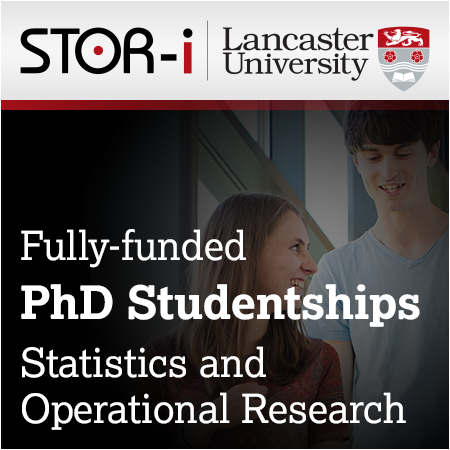Please start typing and select a location from the list
29 PhDs Found
Clear All
Biological Sciences
Health & Medical
Medicine & Dentistry
Other Biological Sciences
PhDs
£10,000 - £14,999
£15,000 - £19,999
£20,000 - £24,999
Search
Sort
The job you're looking for is no longer being advertised. Please see below for similar jobs.
29 PhDs Found
PhD Studentship: Kidney Disease and Haemodialysis: Understanding the Patient Experience to Improve Treatment
Pharmacy
University of Reading
Location:
Reading
Salary:
£20,780
for 2025/26
Date Placed: 16 May
Closes
31 Jul
Cancer And Genomics: Fully Funded Sures PhD Scholarship, Multi-Omics Approach to Characterise an in Vitro Lung Model as a Predictive Tool for Human Health
Biosciences; Cancer and Genomics
Swansea University
Location:
Swansea
Salary:
£20,780
for 2025/26
Date Placed: 14 May
Closes
02 Jun
PhD Studentship in Psychology: Probiotics for Depressive Symptoms, Associated Behavioural Outcomes and Neural Activation: a 3-year PhD Project
School of Psychology and Clinical Language Sciences
University of Reading
Location:
Reading
Salary:
£20,780
p.a.
Date Placed: 08 May
Closes
27 Jun
PhD Studentship: at the University of Exeter and NIHR Healthtech Research Centre (HRCs) for Brain Health: Using APOE-associated AD resilience to identify potential biomarkers
HLS
University of Exeter
Location:
Devon, Exeter
Salary:
£19,237
annual stipend
Date Placed: 07 May
Closes
27 May
PhD Studentship - Assessment of Force Production Characteristics using Portable Force Assessment Technologies in Military Personnel with Knee Injuries
University of Salford
Location:
Salford
Salary:
£19,237
in Year 1 PA for three and a half years
Date Placed: 06 May
Closes
21 May
PhD Studentship - Assessment of Force Production Characteristics using Portable Force Assessment Technologies in Military Personnel with Ankle Injuries
University of Salford
Location:
Salford
Salary:
£19,237
in Year 1 PA for three and a half years
Date Placed: 06 May
Closes
21 May
PhD Studentship in Artificial Intelligence in Medical Imaging and Diagnostics
Faculty of Engineering and Physical Sciences EPSRC Project Proposals 2025/26 - Computer Science
University of Leeds
Location:
Leeds
Salary:
£20,780
Date Placed: 01 May
Closes
02 Jul
PhD Studentship - Preclinical Evaluation of Spinal Therapies
Faculty of Engineering and Physical Sciences EPSRC Project Proposals 2025/26
University of Leeds
Location:
Leeds
Salary:
£20,780
Date Placed: 30 Apr
Closes
30 May
PhD Studentship - Feasibility of a Culturally Tailored Cancer Prehabilitation for the South Asian Community
Manchester Metropolitan University
Location:
Manchester
Salary:
£20,780
Date Placed: 25 Apr
Closes
19 May
PhD Studentship - To Develop Methodology to Measure Alzheimer’s Disease Biomarkers in the Plasma of Obstructive Sleep Apnoea Patients
Manchester Metropolitan University
Location:
Manchester
Salary:
£20,780
Date Placed: 25 Apr
Closes
27 May
PhD Studentship - Investigating the Pathophysiological Effects of Environmental Carbon Monoxide Exposure on the Developing Cardiovascular System During Pregnancy
Manchester Metropolitan University
Location:
Manchester
Salary:
£20,780
Date Placed: 23 Apr
Closes
29 May
PhD Studentship - Multimodal AI for Health and Emotional Assistance
Manchester Metropolitan University
Location:
Manchester
Salary:
£20,780
Date Placed: 23 Apr
Closes
19 May
PhD Studentship - Prehabilitation for Individuals Awaiting Urgent Heart Transplantation
Manchester Metropolitan University
Location:
Manchester
Salary:
£20,780
- please see advert
Date Placed: 23 Apr
Closes
31 May
PhD Studentship - Fostering Well-Being and Mental Health of Elite Soccer Match Officials
Manchester Metropolitan University
Location:
Manchester
Salary:
£20,780
- please see advert
Date Placed: 23 Apr
Closes
30 May
PhD Studentship - The Acute Physical, Physiological, and Perceptual Responses to Training and Competition in Elite Referees
Manchester Metropolitan University
Location:
Manchester
Salary:
£20,780
- please see advert
Date Placed: 23 Apr
Closes
30 May
PhD Studentship - Investigating the Regulation of Liver Glycogen Metabolism: Insights from 13C Magnetic Resonance Spectroscopy
Manchester Metropolitan University
Location:
Manchester
Salary:
£20,780
- please see advert
Date Placed: 23 Apr
Closes
19 May
PhD Studentship - How do Force Sensing Proteins Contribute to the Progression of Liver Fibrosis?
Manchester Metropolitan University
Location:
Manchester
Salary:
£20,780
- please see advert
Date Placed: 23 Apr
Closes
18 May
PhD Studentship - Characterisation of Whipworm Host Defence Peptides: Novel Opportunities for Parasite Control?
Manchester Metropolitan University
Location:
Manchester
Salary:
£20,780
- please see advert
Date Placed: 23 Apr
Closes
18 May
PhD Studentship - Investigating Muscle and Brain Metabolism to Alleviate Post-Exercise Malaise in Chronic Fatigue and Pain Syndromes
Manchester Metropolitan University
Location:
Manchester
Salary:
£20,780
- please see advert
Date Placed: 23 Apr
Closes
19 May
Five Fully Funded PhD Research Studentships
Centre for Future Societies Research
University of Hertfordshire
Location:
Hatfield
Salary:
£20,780
per annum
Date Placed: 22 Apr
PhD Studentship: Unlocking the Therapeutic Power of Faecal Microbiota Transplants: Identifying Key Components for Treating Gut Disease
Department of Biomedical Sciences
University of Birmingham
Location:
Birmingham
Salary:
£20,490
per year
Date Placed: 17 Apr
Closes
02 Jun
PhD Studentship: Investigating RUNX2 mRNA Structural Plasticity and Dysregulation in Fusion Positive Sarcomas
University of East Anglia
Location:
Norwich
Salary:
£19,367
Date Placed: 11 Apr
Closes
18 May
PhD Studentship in Translational Immunology: Understanding the Immunobiology of Flare and Remission in Rheumatoid Arthritis
Newcastle University
Location:
Newcastle upon Tyne
Salary:
£20,780
- please see advert
Date Placed: 10 Apr
Closes
18 May
PhD Studentship - Knowledge Models for Healthcare Digital Twins and Improved Patient Care Pathways
School of Mechanical, Aerospace & Civil Engineering (MAC)
University of Sheffield
Location:
Sheffield
Salary:
£19,237
for 2024/2025
Date Placed: 08 Apr
Closes
31 May
PhD Studentship: Exploring the Effects of Air Pollutants on Immune Mediated K+ Dynamics
School of Pharmacy
University of Reading
Location:
Reading
Salary:
£20,780
Date Placed: 04 Apr
Closes
06 Jun
×
Max Saved Jobs Reached
A maximum of 500 Saved Jobs can be created against your account. Please remove an existing Saved Job in order to add a new Saved Job.
Manage Saved Jobs
Page 1 of 2 >> Next

-17461758859.png)







